Whitepaper on the Ongoing Battle Over Taxation in the Alcohol Industry
January 9th 2023, 10:43am
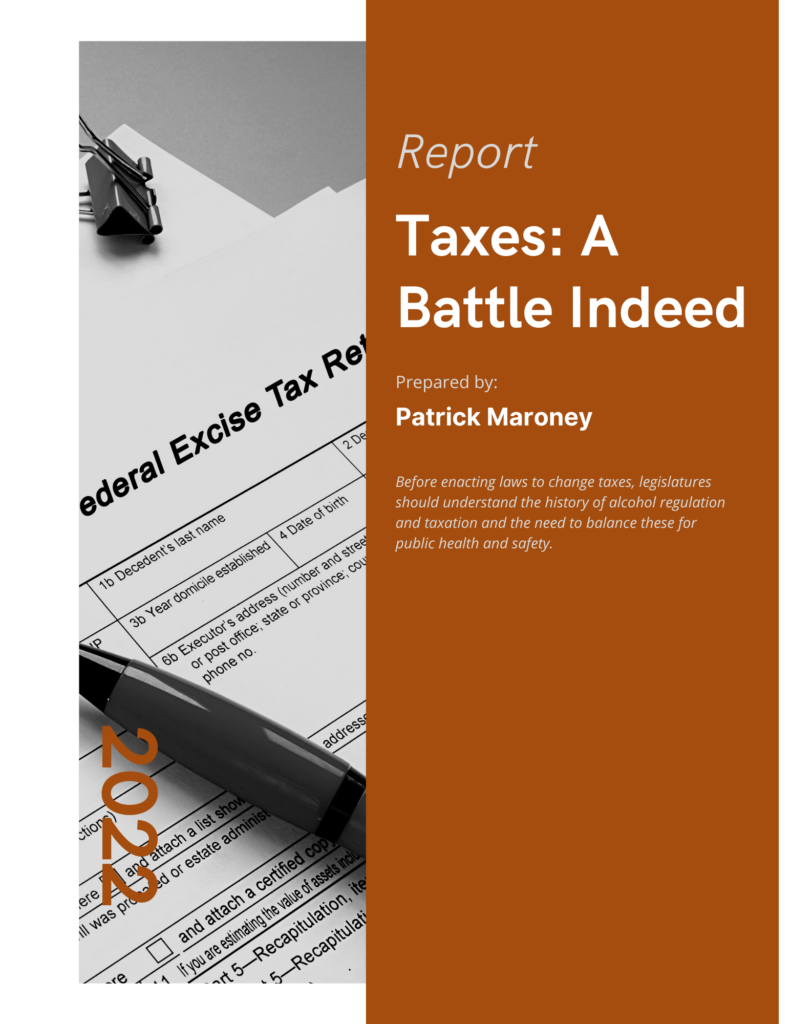
Today the Center for Alcohol Policy released a new whitepaper outlining the battle over taxation in the alcohol industry. The report was commissioned by the Center and authored by Patrick Maroney, President of Maroney Consulting Services, LLC and former Director of the Colorado Department of Revenue’s Liquor Enforcement Division.
“The practice of conducting background checks on liquor license application is a must in order to ensure an orderly and safe marketplace. Keeping unscrupulous actors out of the alcohol industry is an important role of government entities tasked with regulating alcohol production, distribution and sales,” said report author Patrick Maroney.
Maroney’s report provides an overview of the origin of alcohol taxation, and its primary intent of regulating consumption in addition to funding government entities. Citing Toward Liquor Control, Maroney explores the benefits of different levels of taxation for different alcohol products, striking a balance between availability and overconsumption.
After a historical review of the benefits of targeted alcohol tax regimes, Maroney outlines how in modern times, alcohol excise taxes are falling. He finds it critical that legislators and regulators understand the history of alcohol laws, regulations, and taxation toward the goal of public health and safety, but also recognize there is no silver bullet.
“Even prior to Prohibition, there has been a strong understanding of the need to regulate different types of alcohol differently – including how each product is taxed,” said Brannon Denning, Advisory Council for the Center for Alcohol Policy. Denning is also an Associate Professor of Law at Samford University’s Cumberland School of Law in Birmingham, Alabama. “Taxes represent an important aspect of alcohol regulation, one where there is an understanding that the stronger the beverage there ought to be a corresponding increase in its regulation. However, taxation alone will not solve the public health and safety concerns of the nation and policymakers must utilize a broader chest of regulatory tools to accomplish those goals.”
Montana Alcohol Regulator Receives 10th Annual Leadership in Alcohol Regulation Award
August 30th 2022, 1:04pm
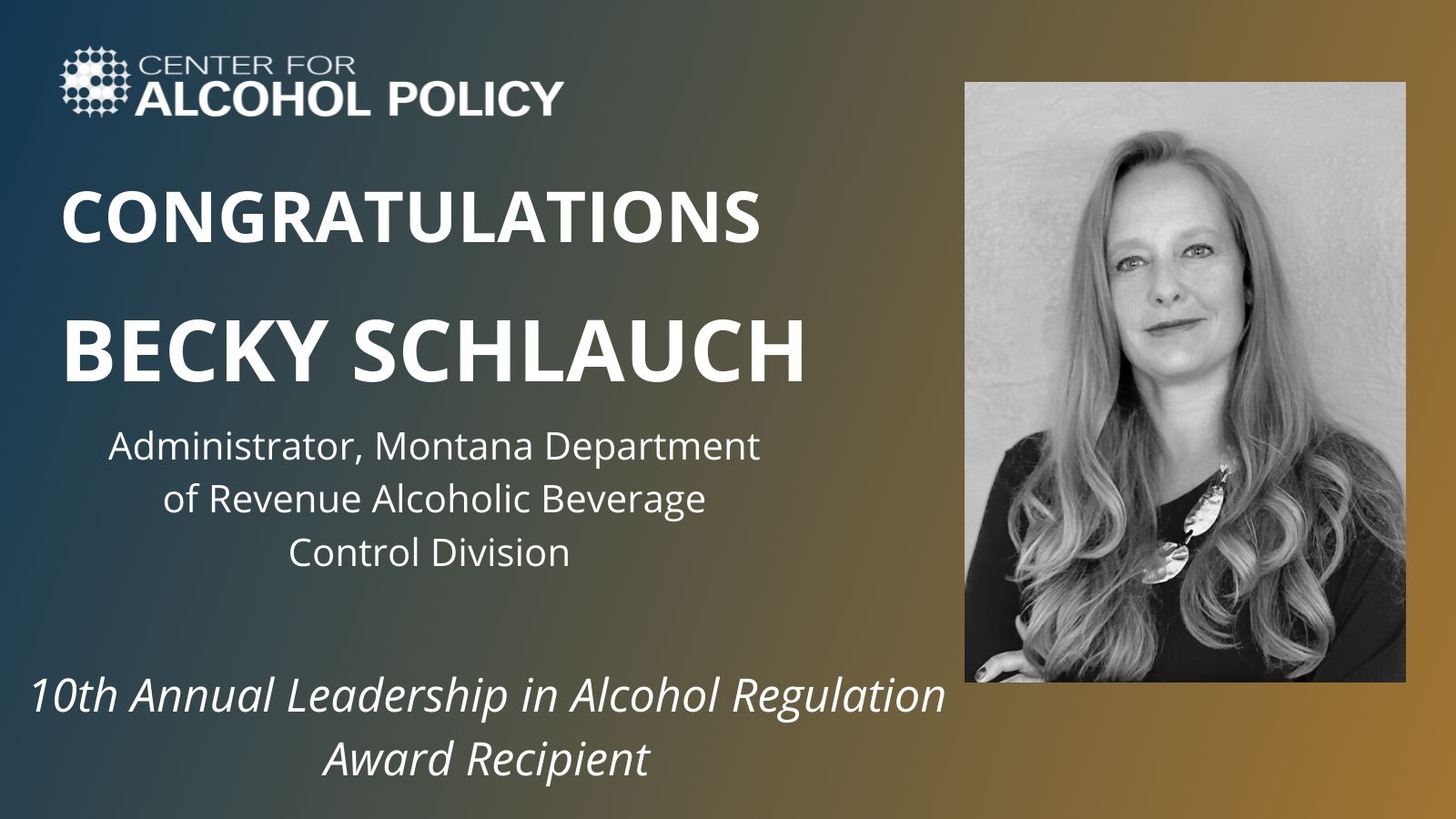 |
Nashville, TN – The Center for Alcohol Policy is pleased to announce it is awarding Becky Schlauch, Administrator of the Montana Department of Revenue’s Liquor Control Division, with its 2022 Leadership in Alcohol Regulation Award.
The Center announced the award, which recognizes a specific program, agency or person who oversees the alcohol industry and promotes public health and safety, at the 15th Annual Alcohol Law and Policy Conference.
“The Center is proud to present this award to Becky Schlauch for providing leadership within the alcohol industry,” said Kelly Roberson, Executive Director of the Center for Alcohol Policy. “Becky is a true public servant, dedicating her career to ensuring government works for the people it serves. She understands the importance of responsible alcohol regulation and how it impacts businesses and communities.”
In July of 2017, Schlauch became the Administrator of the Liquor Control Division, where to this day, she operates the state’s control system for spirits, manages the state liquor warehouse and maintains a profitable operation. Schlauch was also the project lead on revamping the license violation process. Instead of embroiling licensees in lengthy administrative hearings when there is a violation or alleged violation, the new process works toward a settlement with both sides often learning valuable lessons on how the law can be enforced and businesses can be better managed. This ‘compliance verification’ process as she calls it, has made violation procedures less legalistic and less intimidating. She has also worked to train licensees at the beginning of their licensure.
“Becky approaches her work with a spirit of collaboration and common sense,” added Roberson. “She solves problems and is well respected among her peers.”
Schlauch also sits on the board of directors for the National Alcoholic Beverage Control Association and works closely with the Montana Alcoholic Beverage Coalition to provide strategic counsel on legislative matters. Her guidance led to various pieces of legislation drafted by the Coalition being passed in the last legislative session.
Prior to becoming the Liquor Control Division Administrator, Schlauch was the Administrator for the Business and Financial Services Division for the Montana Department of Public Health and Human Services.
8/30/2022
Texas Alcohol Regulator Receives 10th Annual Leadership in Alcohol Regulation Award
August 30th 2022, 1:04pm
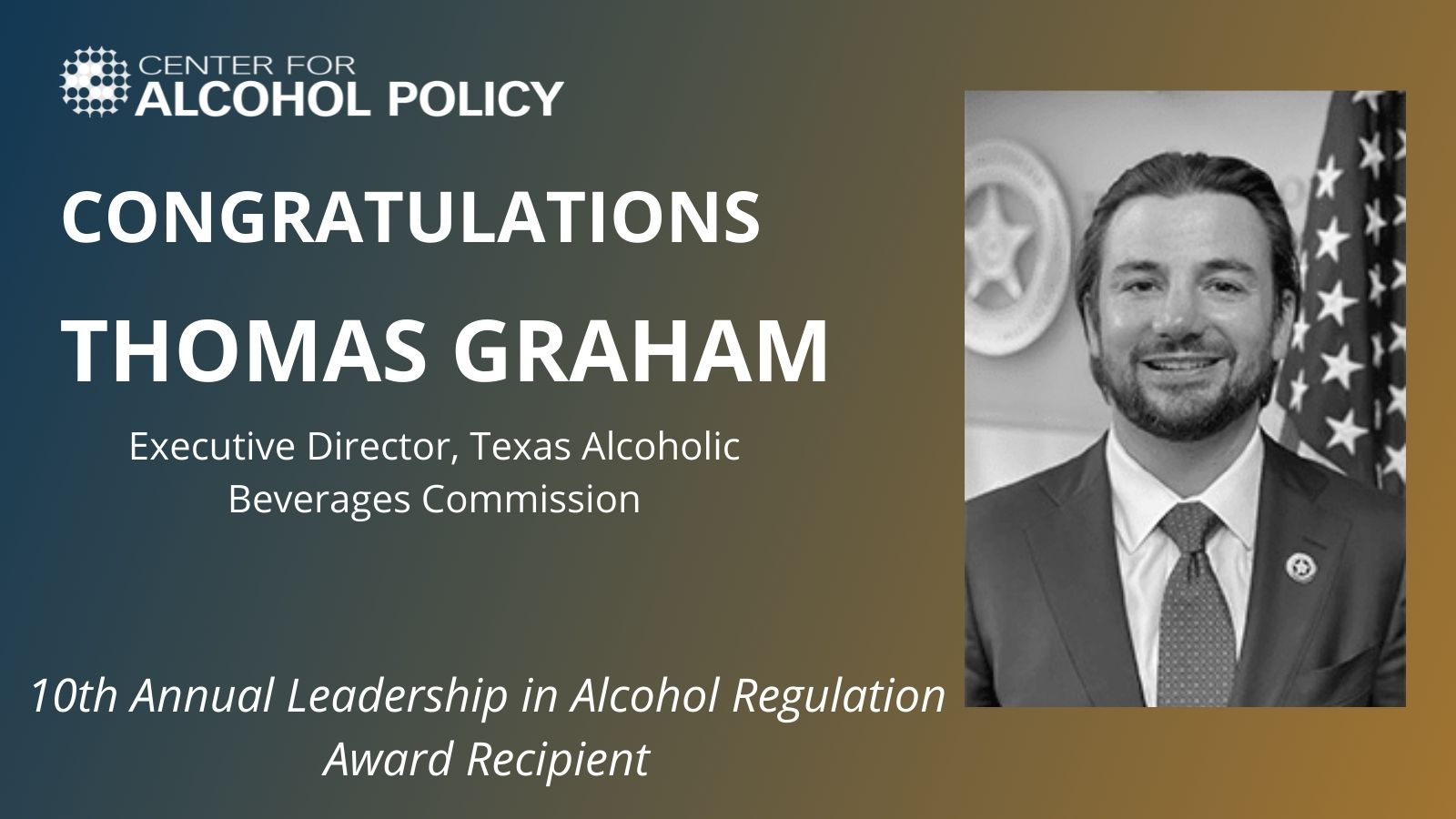 |
Nashville, TN – The Center for Alcohol Policy honored Texas Alcoholic Beverage Commission (TABC) Executive Director Thomas Graham with its 2022 Leadership in Alcohol Regulation Award. The award recognizes the work of alcohol regulators across the country who oversee the alcohol industry and promote public health and safety. The award was presented at the Center’s 15th Annual Alcohol Law & Policy Conference.
“For the last 17 years, Thomas Graham has been a respected and trusted leader in the alcohol industry. As the alcohol marketplace and consumer expectations in Texas have changed, Graham and the TABC have remained nimble and forward looking, ensuring that the manufacture, distribution, sale and service of alcohol in Texas remains safe and properly regulated,” said Kelly Roberson, Executive Director of the Center for Alcohol Policy.
“I also want to commend the TABC for their tremendous leadership in the fight against human trafficking. Since 2013, the agency has canceled the liquor permits of more than 130 businesses accused of engaging in organized crime, including human trafficking, narcotics trafficking and money laundering. This is a great service to communities across the state. The Center for Alcohol Policy is proud to honor Thomas Graham and the TABC for their tremendous work on behalf of the alcohol industry and Texas communities.”
Graham has served at the TABC for the last 17 years and was recently sworn in as Executive Director. He has also served as an auditor, head of the Marketing Practices offices at the TABC Austin headquarters, director of Excise Tax and Marketing Practices, as well as interim Director of Licensing.
Graham holds a Bachelor of Arts in Government from the University of Texas at Austin and is a graduate of the Governor’s Executive Development Program at the University of Texas’s Lyndon B. Johnson School of Public Affairs.
8/30/2022
Former Executive Director, Advisory Council Member Mike Lashbrook Recognized with Life Service Award
November 10th 2021, 4:19pm
Michael Lashbrook, the Center for Alcohol Policy’s former executive director and advisory council member, was posthumously awarded the National Beer Wholesalers Association’s Life Service Award at their 84th Annual Convention and Trade Show October 3-6, 2021 in Las Vegas, NV. Mike passed away from cancer on September 4, 2021. Mike taught many of us a great deal about the alcohol industry, leadership, but most importantly, friendship. The Center for Alcohol Policy is stronger because of his tireless service and work to advance the Center’s mission. He will forever be on our minds and in our thoughts.
Mike grew up in upstate New York, and upon college graduation, moved to Washington, D.C. to begin his professional career, first interning for a U.S. Congressman and then working for 14 years at a large national organization, overseeing the legislative and political activities of a 16-state area, later on becoming a director and executive staff member. He moved to Michigan in March of 1989 to become President of the Michigan Beer and Wine Wholesalers Association.
After Mike retired in 2015, he chose to continue educating and advocating for responsible state-based alcohol regulation and public health and safety by serving as the Center for Alcohol Policy’s first executive director and had recently transitioned to a member of the Center’s Advisory Council. Mike was also recently been appointed by Gov. Gretchen Whitmer and was deeply honored to serve on the seven-member body of Michigan’s Natural Resources Commission.
Mike was a leader, a mentor and a friend. But above all else, he was a family man with a big heart who was happiest spending time with Debra, his wife of nearly 50 years, his children, grandchildren, three brothers and their families. An avid outdoorsman, he was especially passionate about fly fishing and always ready to cast his line in both fresh water and salt water destinations.
Mike did so much to build the Center for Alcohol Policy and his legacy lives on in all the important work the Center continues to do on behalf of responsible state-based alcohol regulation. Your support is crucial to expand that work. If you feel inclined to make a donation in honor of Mike, you can do so below.
14th Annual Alcohol Law and Policy Conference: Highlights from Chicago
September 15th 2021, 1:24pm
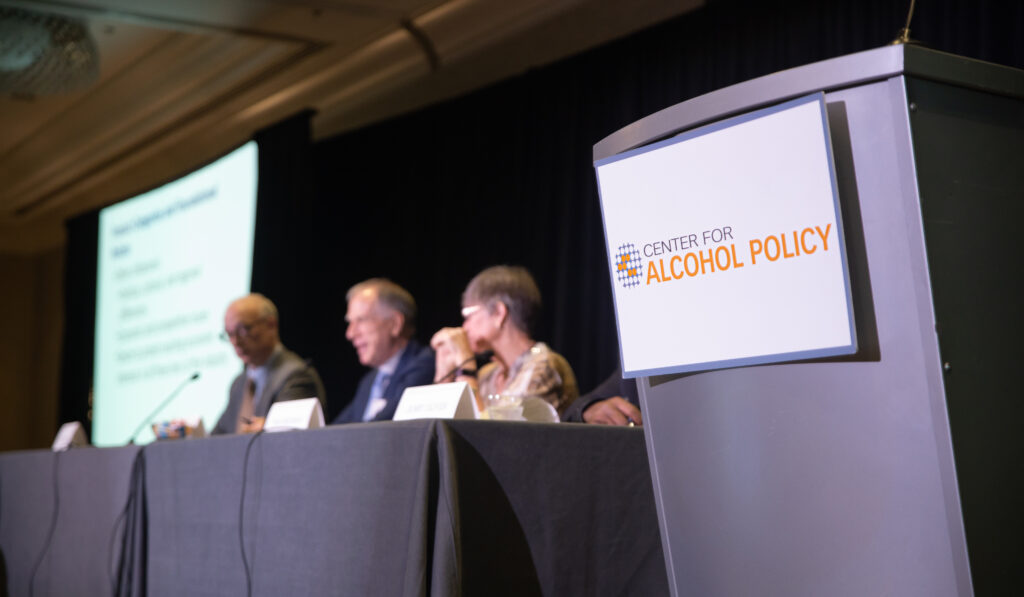
The Center for Alcohol Policy returned to the Windy City August 29-31, 2021, to host its 14th Annual Alcohol Law and Policy Conference (ALPC) with exceptional attendance and an array of highly rated sessions on topics ranging from the intricacies of alcohol regulations and product definitions to a presentation by Dr. David Jernigan on the regulation of cannabis and lessons learned from alcohol.
The ALPC brings together a wide range of stakeholders in the alcohol policy arena to learn about and discuss trending issues and network with regulators, lawmakers, public health advocates, and industry representatives from all three tiers. This year’s hybrid event hosted over 170 in-person and virtual attendees from nearly 40 states. And despite the complexities of hosting a partially virtual experience while navigating public health protocols to ensure a safe environment for everyone in-person, feedback received from attendees was outstanding.
Illinois Attorney General Kwame Raoul was the conference keynote speaker at Monday’s lunch and delivered a sincere appeal to all alcohol policy stakeholders to continue the work of supporting responsible alcohol regulation in our communities.
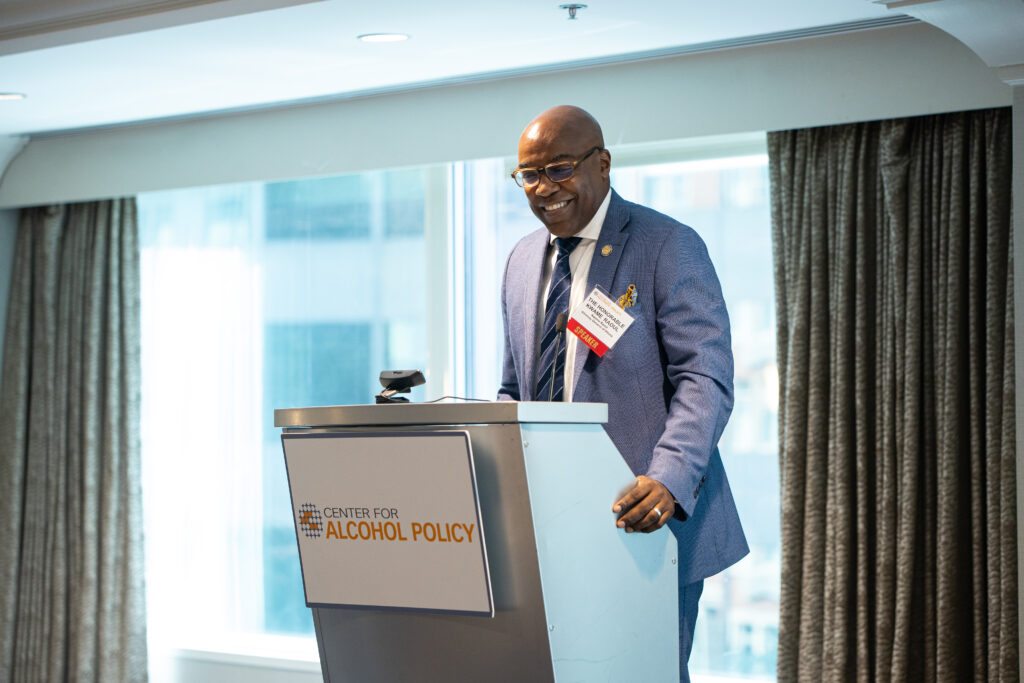
ALPC attendees also heard from pollster Kathryn Hahne of New Bridge Strategy on the results of the Center’s 2021 national sentiment survey on alcohol regulation which found strong, continuing support for state-based alcohol regulation and the three-tier system, despite changing behaviors during the pandemic.
As always, the impact of alcohol regulation on public health and safety was an important theme this year. One particularly exceptional panel focused on the onset of regulation relaxations in response to the Covid-19 pandemic.
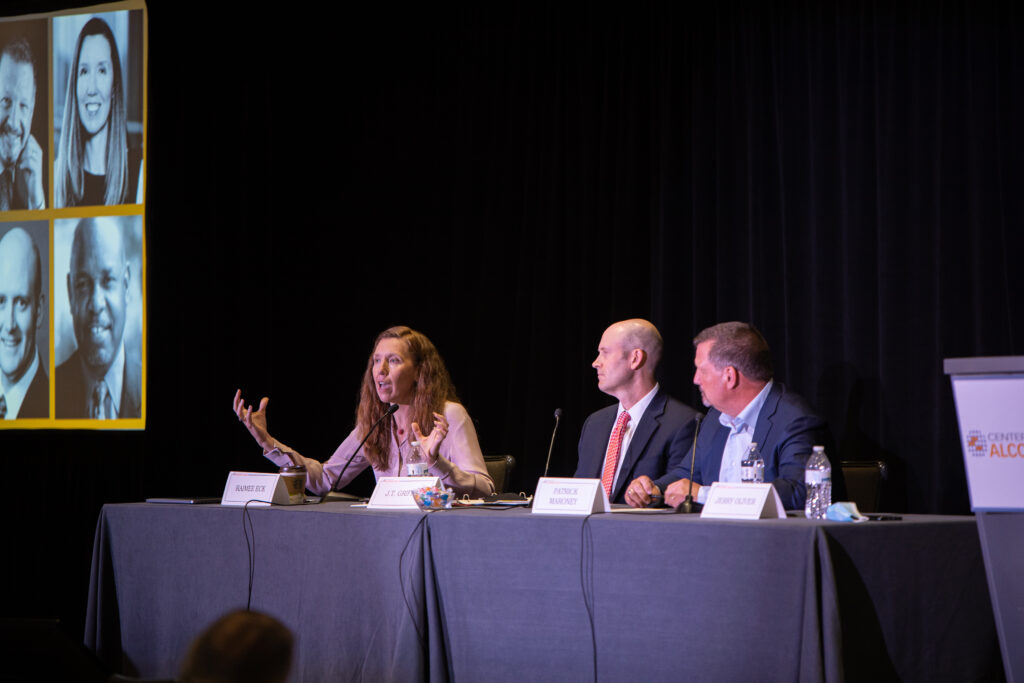
The Center also hosted two distinguished panels of legal experts: One revisited the Supreme Court decision in TWSRA V Thomas, the decision’s impact on state alcohol regulation, and the nearly 10 other litigation challenges currently winding their way through the court system. Another panel welcomed legal experts from both Ohio and Michigan to discuss landmark lawsuits involving the 21st Amendment Enforcement Act and the possibility of similar litigation in more states.
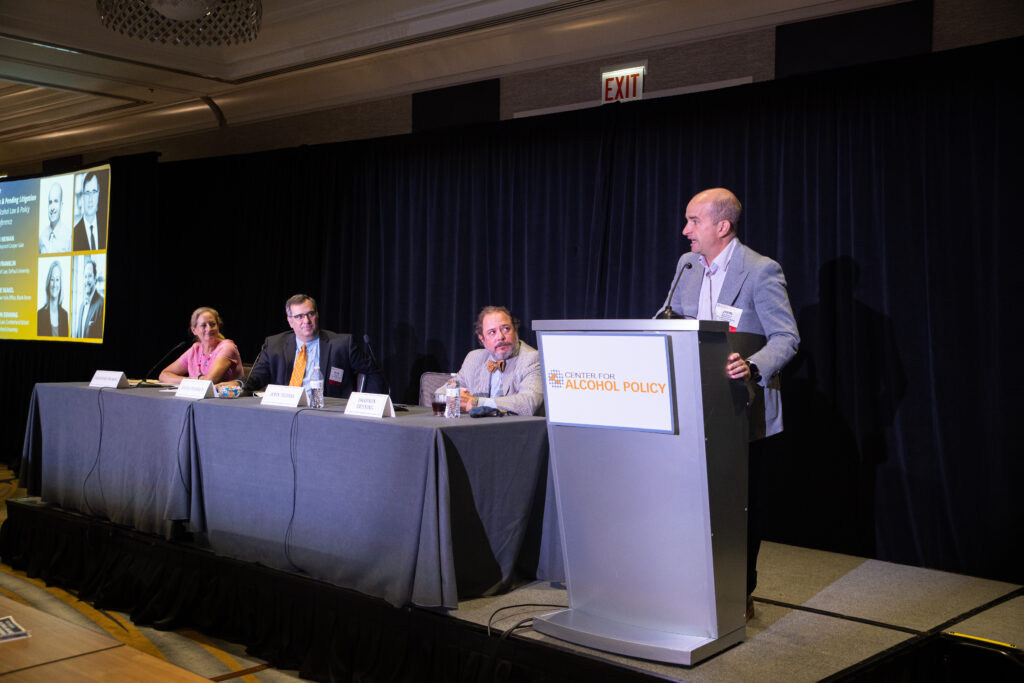
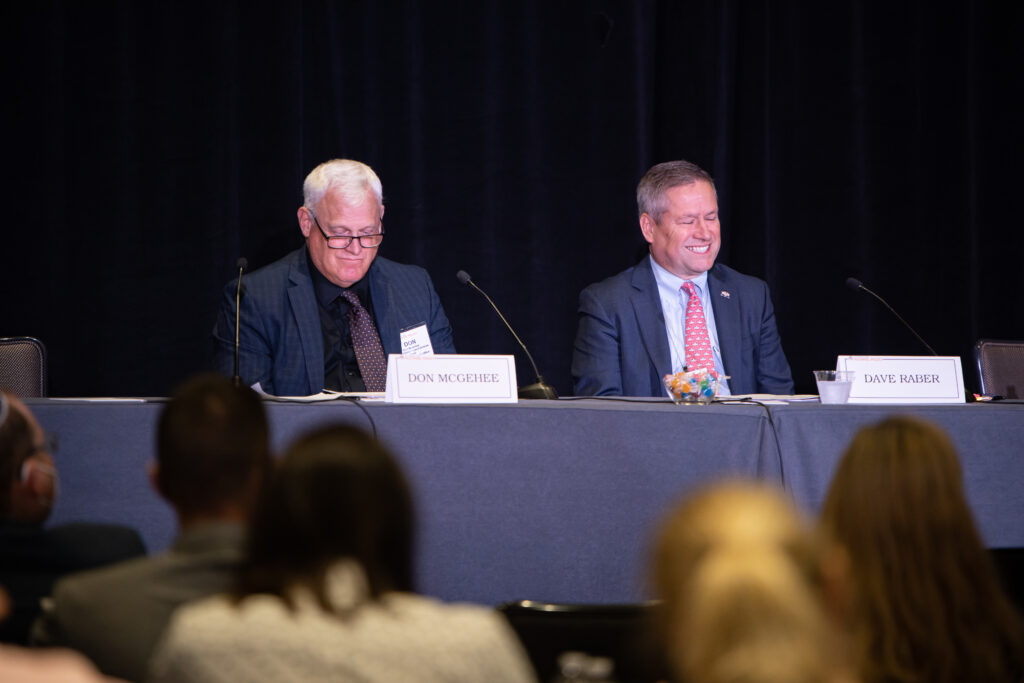
Finally, we appreciated hearing from TTB Deputy Administrator David Wulf who delivered an update on the bureau’s activities, provided insightful information, and answered many of our audiences’ lingering questions about the laws and regulations the agency enforces.

The 14th Annual ALPC was received remarkably well, and alcohol regulation and public health professionals were able to witness the unique value of the Center’s work. We trust that more will do the same in the years ahead!
9/15/2021
Minnesota Alcohol Regulator Receives 9th Annual Leadership in Alcohol Regulation Award
August 31st 2021, 10:24am
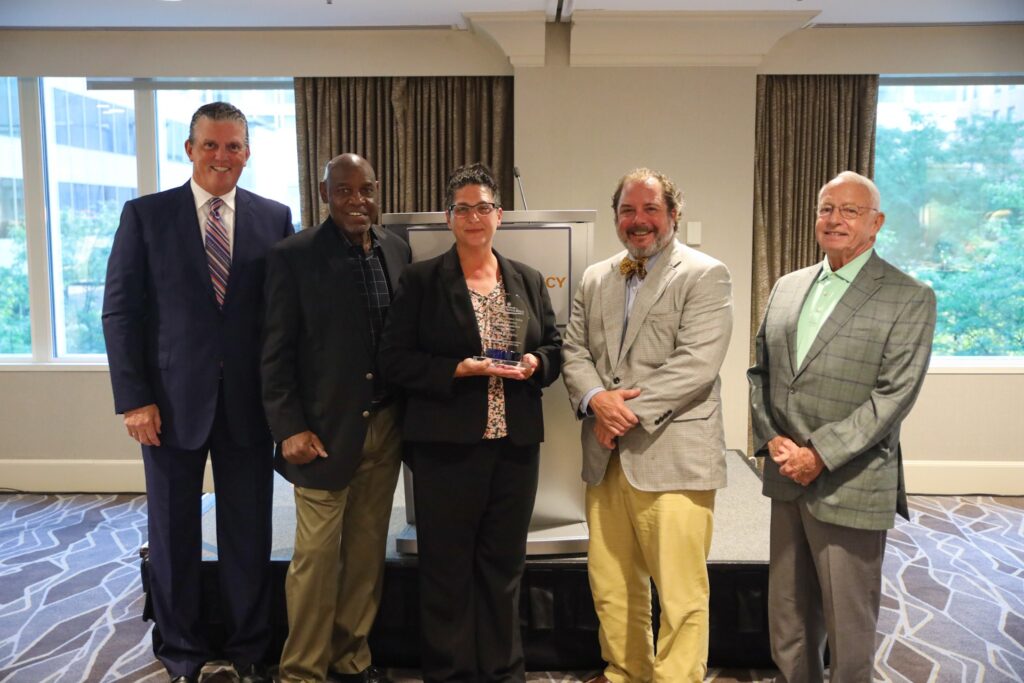
The Center for Alcohol Policy is pleased to announce that Carla Cincotta, Director of the Alcohol and Gambling Division of the Minnesota Department of Public Safety, is the recipient of the Ninth Annual Leadership in Alcohol Regulation Award.
The award, which recognizes a specific program, agency or person who oversees the alcohol industry and promotes public health and safety, was announced yesterday evening during the Center’s 14th Annual Alcohol Law and Policy Conference.
Within the Alcohol and Gambling Division, Director Cincotta has worked as a Special Agent, Senior Special Agent, and Special Agent in Charge, where she directed, coordinated and reviewed investigations to ensure proper regulation and enforcement of state and federal laws.
Before joining the division, Director Cincotta served as a police officer and investigator in the Stillwater Police Department for 10 years, at which she made it a priority to educate the alcohol industry about Minnesota’s liquor laws to ensure proper understanding and compliance, and where violations occurred, Carla aggressively enforced the law in a fair manner.
Over the past year and a half, Carla worked closely with industry members to minimize the economic effects of closures while protecting public health and safety by ensuring that the closure laws were uniformly observed. Carla effectively expanded the capability of the agency in a cost-effective manner and established productive relationships with industry members to ensure that Minnesota’s liquor laws are followed.
The Center could not be more honored to have presented this award to Director Cincotta. Please join us in congratulating her for her years of service and dedication to the industry and the public health and safety of all Americans.
Report Highlights Open Container Laws as Important Countermeasure Against Drunk Driving, Raises Safety Questions in Response to Recent Alcohol-To-Go Legislation
August 27th 2021, 3:47pm
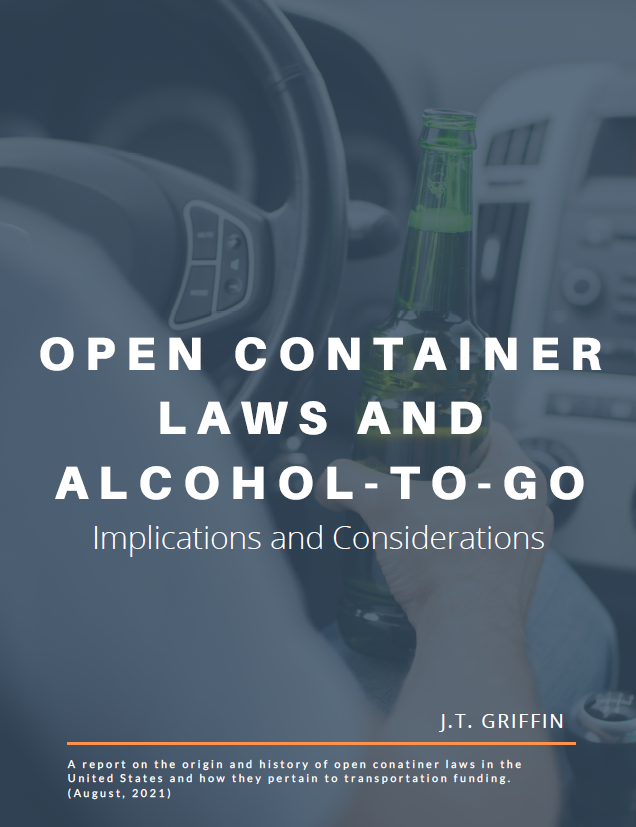
Today the Center for Alcohol Policy released a new white paper outlining the legislative history of open container laws in America, how they act as an important countermeasure in the fight to prevent drunk driving, and also addresses the significant safety questions raised by recent alcohol-to-go legislation following the COVID-19 pandemic.
The report was commissioned by the Center and authored by J.T. Griffin, principal at Griffin Strategies, LLC and former Chief Government Affairs Officer for Mothers Against Drunk Driving (MADD). It follows the publication of the Center’s recent report on the legislative history of drunk driving in America also authored by Griffin.
Open container laws require alcohol beverages to be sealed and stored out of the passenger area in vehicles. Griffin’s latest report provide legislative background to these laws and explains how they serve as an essential “countermeasure available to discourage drunk driving.”
Griffin further discusses present challenges to these existing laws, specifically the onset of alcohol-to-go legislation in response to the dramatic dip in restaurant and bar sales in the wake of the COVID-19 pandemic.
“While efforts to allow alcohol-to-go predate COVID-19, these types of sales were presented as a practical way to help bars and restaurants during the pandemic,” said Griffin, “However, now that things are returning to normal, alcohol-to-go sales raise a host of challenging questions such as federal compliance with open container laws, challenges for law enforcement, and concerns about underage drinking.”
According to Griffin, alcohol-to-go raises substantial safety questions. “For over forty years, the U.S. has sent a strong ‘don’t drink and drive message’ to the public. Groups like MADD have helped educate the public on the dangers of drinking and driving, including passage of strong open container laws,” says Griffin, “As lawmakers consider these new laws, they must take into account the public health concerns that can occur from relaxing alcohol laws.”
It is very possible that alcohol-to-go legislation may confuse this messaging, as stated in the report. Although these laws provide that to-go cocktails, wine, or beer must be covered, the laws do not guarantee compliance with federal open container laws.
“Time and again, Americans have made their opinion known: they want policymakers to prioritize public health and safety above increased convenience for acquiring alcohol – the Center has polled the public on this very topic for nearly a decade. Rather than rushing to make temporary privileges permanent, lawmakers ought to carefully weigh the long-term, far reaching public health impact that alcohol-to-go will have” said Jim Hall, former Chairman of the National Transportation Safety Board and Center for Alcohol Policy Advisory Council member.
“There are a number of issues that should be thoughtfully considered before making any deregulatory privileges permanent such as time of sale, alcohol outlet density, underage sales, and the reduced capacity of police officers to enforce federal open container laws, just to name a few. And of course, we cannot forget the tremendous toll that drunk driving has taken on our communities. It’s possible that alcohol-to-go could cause a serious setback to our nation’s historic success in the fight against it,” said Hall.
White Paper Identifies Legislative Successes in Fight Against Drunk Driving, Finds Challenges Still Exist
August 12th 2021, 2:45pm
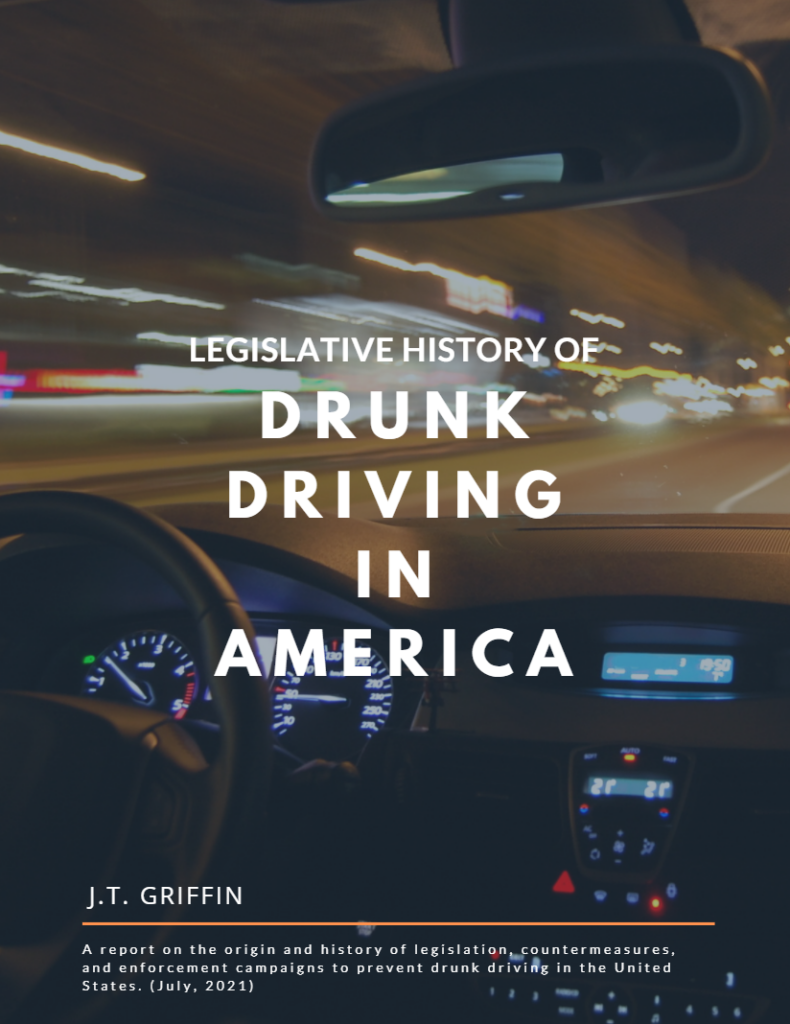
Today the Center for Alcohol Policy (the Center) released its latest report outlining the legislative history of drunk driving in America, progress made in the fight against it, and present and future challenges that still exist. The white paper was commissioned by the Center and authored by J.T. Griffin, principal of Griffin Strategies, LLC and former Chief Government Affairs Officer for Mothers Against Drunk Driving (MADD).
“From BAC limits to the 21 minimum drinking age, the nation has made tremendous progress in reducing the harms of drunk driving, but despite these accomplishments, more needs to be done,” says Griffin. “If law enforcement continues to take the lead in this fight, and manufacturers embrace future safety system technologies, we could see the end of drunk driving.”
Griffin’s report focuses on laws and countermeasures that the federal government and state legislatures have enacted since 1980 to reduce drunk driving. These countermeasures include:
- The 21 minimum drinking age
- Open container laws
- Keeping the alcohol industry regulated through a three-tiered system
- A national .08 BAC per se limit
- High visibility law enforcement
- Ignition interlock systems
Griffin additionally discusses future technologies such as advanced alcohol detection technologies that could one day eliminate drunk driving. These passive systems could be ready and in the vehicle soon and would be able to detect impairment to stop drunk driving.

The report points out that while 28 percent of all alcohol-related deaths involve drunk driving, there has been a 38 percent drop in drunk driving deaths since 1982. But despite this success, “progress in reducing drunk driving deaths has stalled.” Drunk driving deaths have risen steadily since 2011. According to the report, “early estimates from 2020 predict a 9 percent increase over 2019 deaths, a clear indication that there is still much work to be done.”
“While it is encouraging that drunk driving has steadily decreased over the past 30 years, we all know that even one death caused by drunk driving is one too many,” said Jerry Oliver, Advisory Council member for the Center for Alcohol Policy. Oliver is also the former Detroit Chief of Police and Director of the Arizona Department of Liquor License and Control. “This report is an excellent primer that reminds us of the reasons we have our current laws surrounding drunk driving and encourages policymakers to continue crafting forward thinking legislation that will enable progress in the fight to eradicate drunk driving.”
Responsible Retailing Forum Releases Second Research Brief in Series on Underage Sales and Why They Occur
July 20th 2021, 1:47pm
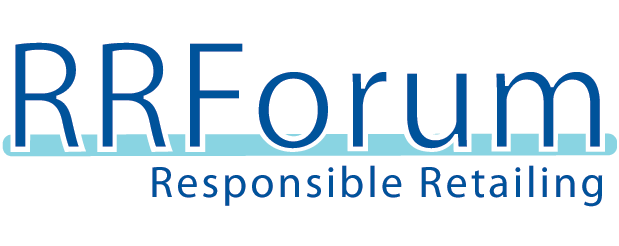
Brad Krevor, director of the Responsible Retailing Forum (RRF), is releasing a series of research briefs based on “insights and learnings from 25 years of research in responsible retailing.” You can read brief #1 here.
His second brief explores a new strategy for achieving compliance. Krevor outlines that the persistence of underage sales despite staff training, point-of-sales protocols, and supervisory practices has led to a new strategy to improve ID-checking that is equally effective with retail stores and on-premises serving establishments. You can read the full brief below.
Research Brief #2: How to improve compliance rates – Part 1
Context: The first Research Brief (Why Do Underage Sales Occur?) described why intensive efforts by large national chains to implement ambitious Responsible Retailing programs failed to eliminate underage sales:
“Retail work is highly repetitive, and workers’ minds wander. Underage sales occur for the same reason as many industrial accidents: momentary lapses in concentration. William Chandler, the former director of alcohol law enforcement in North Carolina, thus aptly defined underage alcohol sales as crimes of inattention.”
This should lead managers to consider how they can maintain staff awareness.
A New Strategy for Achieving Compliance: Starting in 2004, RRForum met periodically with large national chains (including Walgreens, CVS, Walmart, 7-Eleven, and petroleum marketers) who had entered Assurances of Voluntary Compliance (“AVC”) with 43 state Attorneys General. These AVC’s stipulated training, supervisory practices, and point-of-sales protocols intended to reduce underage sales of tobacco and other age-restricted products. They also required the chains to conduct periodic “mystery shops” to observe changes in staff ID-checking rates. When the AVC failed to improve ID-checking in the one chain (ExxonMobil) that RRForum was studying closely, we tested the idea of expanding the mystery shops from unreported observations intended only to gather research data into a real-time intervention for staff. Instead of leaving the store after an attempted purchase without revealing themselves, the mystery shoppers were instructed to provide on-the-spot feedback to the clerk and store manager. If the clerk asked for an ID, the mystery shopper would present a card explaining the purpose of the inspection and congratulating the clerk and store manager or owner-operator for correctly verifying age. When no ID was requested, the card warned that a similar failure in a law enforcement compliance check could expose the clerk and store to penalties under both store policies and state law. Since, we learned, the cards issued in a failed inspection were sometimes destroyed before the owner-operator could see them, we also sent a written report to the licensee.
RRForum tested this use of mystery shoppers to provide on-the-spot feedback to staff in Albuquerque, NM, Iowa City, IA, and Waltham, MA (home of Brandeis University, where RRForum was launched in 2003). In two sites, Iowa City and Waltham, mystery shopper feedback produced significant improvements in ID-checking rates. In Albuquerque, ID-checking began and remained consistently above 90%, a result of intensive alcohol law enforcement.
Validation of the Mystery Shopper model: This pilot project led to a Small Business Innovation Research award from the National Institutes of Health to further develop and validate mystery shops as a means of improving ID-checking. With the assistance of the state alcohol regulators in California, Massachusetts, Texas, and Wisconsin, RRForum identified eight pairs of demographically similar communities, two in each state, representing large and small cities, blue collar communities, and suburban communities. We identified fifteen+ on-premises and off-premises retailers in each community and conducted three baseline inspections. After establishing a baseline, one community (Early Intervention) licensees received six monthly mystery shops with on-the-spot feedback and written follow-up reports while its paired community (Delayed Intervention) served as a control. After six months, we ended the program in the Early Intervention community and conducted the program with the Delayed Intervention community. Results. ID-checking percentages rose significantly, from slightly over 80% at baseline to slightly over 90%, peaking at 94% at the end of the six months, in both Early Intervention and Delayed Intervention communities. Improvements were almost identical for off-premises and on-premises establishments.
Discussion: Mystery shops demonstrably produce and sustain improvements in staff ID-checking. The high ID-checking rates achieved in this study stand out particularly because licensees were randomly selected, had paid nothing for the mystery shop visits, and were shielded against consequences for improper staff conduct (although community ID-checking rates were disseminated to alcohol enforcement and regulatory agencies, individual results remained confidential).
Mystery shopper feedback allow licensees to monitor staff performance. Inspections are an occasion for managers to share the results with all staff and reinforce the importance of checking IDs. In our formative research, owner-operators and managers expressed strong support for mystery shopper reports. Passed inspections were seen as positive reinforcement of the licensee’s protocols for verifying age. Failed inspections often elicited surprise and dismay (“But we always check IDs!”), underscoring the most important insight for licensees: staff that are well trained in how and when to conduct an ID-check are nonetheless prone to lapses in attention.
Many owner-operators and managers saw the mystery shop as a valuable tool to help staff do their job correctly; for the research team, however, the mystery shop is a tool to help operators and managers do their job correctly, i.e., remind staff continually on the need to check IDs.
Take-away: The mystery shop is a proxy for a law enforcement compliance checks, providing feedback to licensees on ID-checking conduct without risk of negative outcomes for operators or staff. Periodic mystery shops achieve and sustain high ID-checking for all types of licensees and prepare those licensees to pass law enforcement compliance checks. Mystery shops remind staff that ID checking is being observed.
Mystery shop programs have been employed by diverse alcohol stakeholders. RRForum has conducted 21 Matters™, its mystery shop program, for individual retailers, chains, retail associations, and communities; and branded programs for brewers (MillerCoors Respect 21 ™ Responsible Retailing Program), distillers (Brown-Forman’s Responsible Retailing Initiative) and their distributors. in Montgomery County, MD, RRForum’s mystery shop program has been incorporated into a comprehensive compliance scheme in which licensees may receive either a
law enforcement compliance check or a mystery shop inspection.
To learn more about 21 Matters™, open this link. For the journal article on the effectiveness of mystery shops, open this link.
If you would like to receive additional Research Briefs in this series, and other RRForum news, register here.
About Responsible Retailing Forum
RRForum brings together public and private stakeholders—regulatory and enforcement agencies; attorneys general; public health agencies and advocates; retailers and their associations; distributors and producers; and researchers in order to –
- identify and promulgate Best Practices to prevent underage sales of age-restricted products; and
- examine the impacts of RR policies from the diverse perspectives of these different stakeholders.
Responsible Retailing Forum Releases First Research Brief in Series on Insights from 25 Years
June 16th 2021, 1:47pm

Brad Krevor, director of the Responsible Retailing Forum (RRF), will be releasing a series of research briefs based on “insights and learnings from 25 years of research in responsible retailing.”
His first brief, which was released this week, addresses underage sales of alcohol, why they occur, and reviews a study conducted by researchers at Brandeis University that analyzed the implementation and effectiveness of an ExxonMobil Assurance of Voluntary Compliance (AVC), a responsible retailing program. The study revealed why underage sales persist despite intensive training and point-of-point sales protocols. You can read the full brief below.
Research Brief #1: Why do underage sales occur?
Context: In 2002, ExxonMobil executed an Assurance of Voluntary Compliance (AVC) with 43 state attorneys general who had engaged national retail chains found to have sold tobacco products to minors. The AVC committed ExxonMobil to sweeping changes in the training, supervision and point-of-sales practices and policies to prevent underage sales of alcohol and tobacco in its 950+ Company-Operated Retail Stores (“CORS”) across the country. An award from the Robert Wood Johnson Foundation allowed researchers at Brandeis University to assess the implementation and effectiveness of the ExxonMobil AVC as a public health strategy to prevent underage access to age-restricted products. The study design included comparisons between CORS that consistently passed compliance checks, and CORS with one or more recent violations, in hopes of identifying predictors of compliance and non-compliance with underage sales laws.
Surveys were conducted with 1,225 clerks and 284 managers in 460 Exxon and Mobil CORS, following the AVC trainings and policy changes. Survey responses revealed that staff training had been very effective. Clerks correctly identified, at rates well over 90%: the trigger age for an ID check; acceptable forms of IDs; and the consequences for selling to a minor (termination). Clerks expressed at similarly high rates that they personally took preventing underage sales seriously and that they consistently checked IDs. But clerks also expressed a belief that other clerks, store managers, and managers all the way up the corporate ladder shared the same concerns and commitment to preventing underage sales. The implementation of the AVC and the change in corporate culture were very, very impressive.
Unfortunately, ExxonMobil’s well-implemented, comprehensive underage sales prevention program had no impact upon age-verification rates! In the first inspection of all CORS following the AVC, ID-checking rate for all ExxonMobil CORS was 85.4% — higher than FDA compliance rates up until February 2003 (when the US Supreme Court halted the FDA program) but less than anticipated after the recent trainings and policy changes. But in each of the following three quarters, pass rates dropped even further (70.2%, 65.3%, 60.6%). Over the subsequent two years, pass rates fluctuated between 52% and 84.5%.
Why would well-trained staff and managers who professed strong support for preventing underage sales, and who knew that a lapse in ID-checking could lead to termination, still fail to check IDs so often? To examine this question, the research team compared the knowledge, attitude, and self-reported behavior of clerks in consistently compliant CORS with those in non-compliant CORS. What we learned, however, was that the knowledge, attitudes, and behavior of clerks were the same in all stores, regardless of ID-checking performance. There were no predictors of clerk compliance / non-compliance.
The researchers came to recognize that the underlying problem was INATTENTION. Retail work is highly repetitive, and workers’ minds wander. Underage sales occur for the same reason as many industrial accidents: momentary lapses in concentration. William Chandler, the former director of alcohol law enforcement in North Carolina, aptly defined underage alcohol sales as “crimes of inattention.”
If the underlying problem is inattention, one potential remedy would be continual reinforcement of ID-checking policies and protocols. To that point, the only noticeable difference between compliant and non-compliant CORS in the ExxonMobil study was that clerks in stores that passed all their inspections expressed that “my manager is always on my back to check IDs.”
The take-away is that thorough training and explicit policies for age-verification are necessary – but not sufficient. Managers need to reinforce age-verification continually. This is as true today as when the ExxonMobil study was conducted.
For a fuller discussion of the ExxonMobil study, click here. To read the Tobacco Control journal article on the application of Consumer Protection Authority in preventing underage sales, click here.
How mystery shopper programs emerged to counter the problem of inattention will be examined in Research Brief #2.
If you would like to receive additional Research Briefs in this series, and other RRForum news, register here.
About Responsible Retailing Forum
RRForum brings together public and private stakeholders—regulatory and enforcement agencies; attorneys general; public health agencies and advocates; retailers and their associations; distributors and producers; and researchers in order to –
- identify and promulgate Best Practices to prevent underage sales of age-restricted products; and
- examine the impacts of RR policies from the diverse perspectives of these different stakeholders.
Illinois Attorney General Kwame Raoul to Keynote 2021 ALPC
June 8th 2021, 11:51am
We are pleased to announce that the Honorable Kwame Raoul will keynote the Center’s 14th Annual Alcohol Law and Policy Conference taking place in Chicago, August 29-31, 2021.
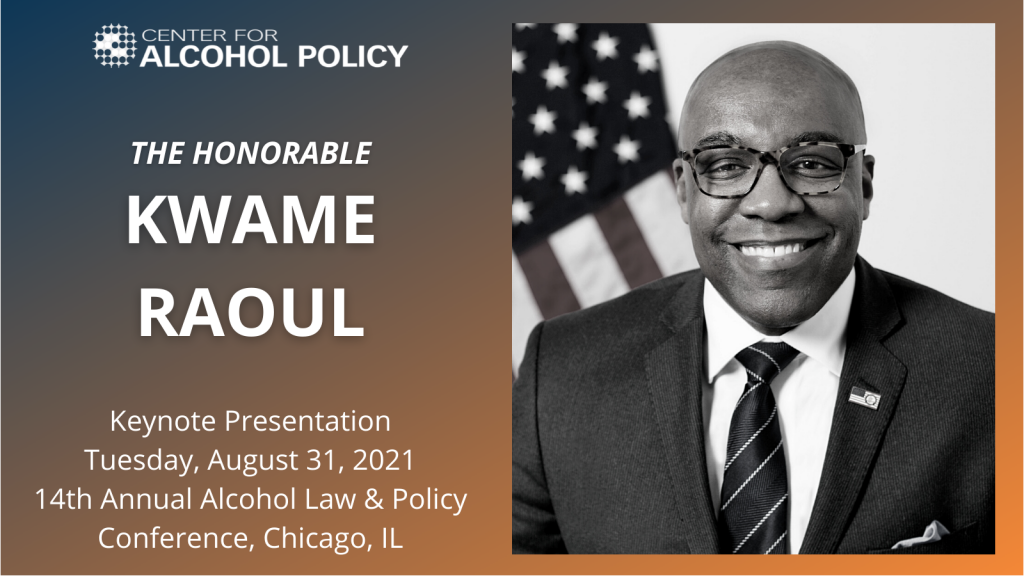
About Attorney General Raoul
A native of Chicago and the son of Haitian immigrants, Raoul brings a lifetime of legal and policy experience, advocacy and public service to the Office of the Attorney General. As the state’s chief legal and law enforcement officer, Attorney General Raoul has demonstrated a commitment to protecting Illinois residents by leading the “people’s law firm.” He has initiated efforts to provide aid to those impacted by violence, defend the rights of workers, and protect consumers from scams, especially throughout the Covid-19 pandemic.
In particular, Raoul has continued championing the office’s efforts to protect Illinois consumers from counterfeit products. He has prioritized efforts to hold accountable industries that manufacture and sell products that threaten consumers’ health and safety – efforts that are critical in the alcohol beverage industry today.
Prior to serving as Illinois’ 42nd Attorney General:
- He served 14 years as a state senator for the state’s 13th Legislative District
- Served as a prosecutor in the Cook County State’s Attorney’s Office
- Served as a senior staff attorney for the City Colleges of Chicago
- Served as a partner at two national law firms
We are thrilled to have Attorney General Raoul speak at our 2021 conference, and we hope you’ll join us there!
Despite Changing Behaviors During Pandemic, America’s Attitude Remains the Same: The Alcohol Regulatory System Works and Americans Like It
April 15th 2021, 4:03pm
ALEXANDRIA, Va. – A new poll commissioned by the Center for Alcohol Policy on public sentiment toward alcohol regulation in the U.S. found that despite some changing behaviors during the COVID-19 pandemic, attitudes among adult Americans remain the same: the long-standing alcohol regulatory system in the U.S. works, and people like it. Although many states have temporarily loosened some alcohol laws in response to the pandemic there is overwhelming consensus throughout the nation that alcohol is a product that needs to be regulated. In fact, a CAP survey record-high 85 percent of Americans are satisfied with the existing system for alcohol regulation in their respective states.
Key findings from the Center’s survey show – as they have consistently in years past – that Americans want alcohol laws to prioritize public health and safety. The public strongly believes that alcohol-related problems are serious concerns, and that health and safety should be at the forefront when lawmakers consider any changes to alcohol regulations.
“Public satisfaction with responsible state alcohol regulation hit a CAP survey high this year. In spite of consumer shifts in behavior during the pandemic, most Americans still agree that alcohol is not like toilet paper or tin foil, and it needs to remain carefully regulated,” says Jim Hall, former Chairman of the National Transportation Safety Board (NTSB). Hall is also an Advisory Council member for the Center for Alcohol Policy. “This year’s poll clearly shows that across the board, Americans want to keep their communities safe and agree lawmakers should prioritize public health and safety when they consider making these changes to alcohol laws permanent.”
Top line findings from the survey include:
- Support remains overwhelming for individual state regulation of alcohol
- Most Americans reject the notion that alcohol is just like other consumer products
- 80 percent of respondents show support for states regulating through a three-tier system, which has been consistent over the past decade of the Center’s polling
- 71 percent of Americans are satisfied with the alcohol regulations in their state
- A majority agree that states should evaluate the impact of COVID-19 inspired deregulations before making them permanent.
Click here to read the key findings memo by New Bridge Strategy. The Center has also produced a more detailed report for your use that you can download here.
The survey was conducted by New Bridge Strategy among 1,002 adults ages 21 and older throughout the nation [1]. The interviews were conducted online and distributed proportionally throughout the U.S. and are demographically representative of this age group. The survey was the latest look at core attitudes on several facets of alcohol regulation that have been tracked for more than a decade.
1. The confidence interval associated with this sample is +/-3.5% at the 95% confidence level; with varying confidence for population subgroups within the sample.
St. Louis Attorney Wins First Place in Center for Alcohol Policy Writing Competition
March 9th 2021, 10:15am

The Center for Alcohol Policy is pleased to announce that Monica Pechous, a Chicago-Kent College of Law graduate, has been named the winner of its 13th annual writing competition. Pechous graduated from Kent Law in December of 2020 and will start full-time as an intellectual property litigation associate at Tucker Ellis, LLP in St. Louis, MO later this year.
“The Center’s annual writing competition is an extremely valuable tool for education and advocacy… Because of my participation in the competition, I have a greater appreciation of the nuances of alcohol regulation. Alcohol regulation does not occur in a vacuum—it draws heavily on legal, social, and political factors. As such, I think understanding the intricacies of alcohol regulation is key to developing effective future policy.”
Monica Pechous, 1st Place Award Recipient, 13th Annual Writing Competition
The national writing competition is intended to foster debate, analysis, and examination of alcohol policy in the 21st Century. Last year’s topic addressed appropriate public health responses to the unprecedented COVID-19 pandemic and asked respondents to consider the nation’s history of alcohol prohibition in their analyses.
Prohibition of alcohol was tried in 1920 but ultimately rejected by the United States. Similarly, pure laissez-faire treatment of alcohol and the industry that profits from it has not been the policy of the federal or state governments. As the nation seeks the proper public health balance in response to COVID-19, can this nation’s alcohol history help shape and inform government health policies related to dealing with the COVID-19 pandemic?
“The COVID-19 pandemic provided participants with a unique opportunity to explore the history of alcohol regulation and Prohibition in America and relate it to the government’s response to the unparalleled events the country has faced throughout the past year,” says Center for Alcohol Policy Advisory Council member Jim Hall. “This year’s award recipients delivered exceptional research on the political environment surrounding 1920s Prohibition and provided a stimulating ‘lessons learned’ analysis of the public health crisis happening now.”
Pechous’ winning essay, “Beverages and Balance: Lessons in Alcohol Policy as Applied to the COVID-19 Pandemic”, provides an in-depth analysis and comparison of the “political contention” during American Prohibition to today’s COVID-19 public health crisis and argues that governments should look to the nation’s history of alcohol regulation when implementing public health polices in response to the pandemic.
“By effectively balancing federal and state interests, allowing limited incentive-based federal mandates, and promoting greater health literacy in the American people—all tenets of successful alcohol policy applicable to COVID-19 concerns—the United States will position itself to effectively slow the spread of COVID-19 in the months and years to come”, writes Pechous.
Second-Place: Adriel Barrett-Johnson

Adriel Barrett-Johnson, a senior consultant for international development at Deloitte in Washington, D.C., placed second with her essay, “Consuming Alcohol (History) May Cure COVID-19 (Policy): Expansion of the Principles of Alcohol Regulation in the COVID-19 Pandemic”. Barrett-Johnson acknowledges that alcohol has long been one of the few consumer products where a proper balance between social enjoyment and public harm is needed, but that in 2020 ”nearly all commercial enterprises joined alcohol in needing to balance these conflicting objectives as a result of the COVID-19 pandemic.”
With this in mind, she explains that “state leaders setting pandemic policy should learn how to handle the tension between maximizing the economy and public health from alcohol regulators who have been doing this for over a century.”
Ms. Barrett-Johnson graduated from the University of Virginia where she studied economics and statistics, and she will soon start graduate school at UPenn Wharton, completing a joint MBA and MA in Latin American Studies.
Third-Place: Emily Seaton

Receiving third place for her essay, “Are the 2020s Truly “Unprecedented” times? How America’s Alcohol History Can Inform Government Health Policy During the COVID-19 Pandemic,” Emily Seaton, an attorney in North Carolina and a former United States District Court Clerk, addresses the topic similarly to Ms. Pechous and Ms. Barrett-Johnson. Seaton states that reinventing the wheel is unnecessary when considering appropriate public health policies to address the consequences of the COVID-19 pandemic.
“State regulation often proves more effective and more adaptable… [but] just as the federal government continues to nudge alcohol control in the United States, so too can it nudge compliance with COVID-19 recommendations from public health officials”, Seaton writes.
Ms. Seaton obtained her B.S. in Economics from Wofford College in 2016 and then her J.D. from the University of Georgia School of Law in 2019, where she served as Executive Editor of the Georgia Journal of International and Comparative Law.
Alabama Alcohol Regulator Receives 2020 Leadership in Alcohol Regulation Award
September 23rd 2020, 2:00pm
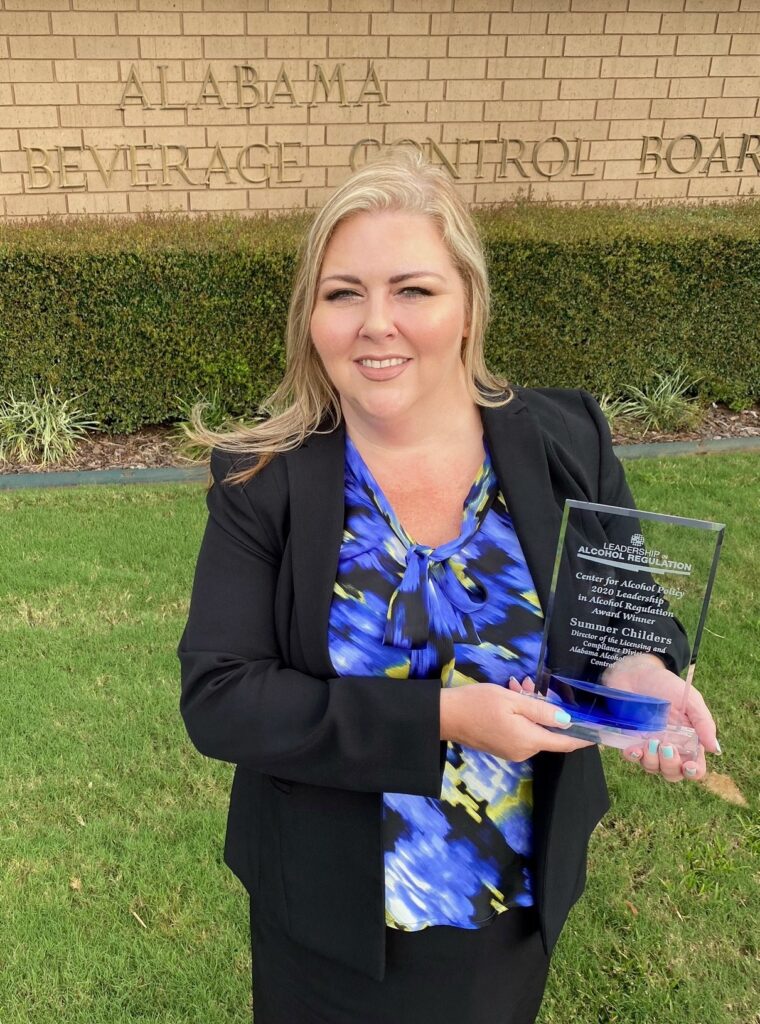
The Center for Alcohol Policy is pleased to announce that Summer Childers, Director of the Licensing and Compliance Division of the Alabama Alcoholic Beverage Control Board, is the recipient of the Eighth Annual Leadership in Alcohol Regulation Award.
The award, which recognizes a specific program, agency or person who oversees the alcohol industry and promotes public health and safety, was announced during the Center’s 13th Annual Alcohol Law and Policy Conference.
Director Childers has served the State of Alabama for 10 years and has become an invaluable resource for the state and local governments, the alcohol industry, and anyone interested in alcohol regulation in the state of Alabama. Ms. Childers was chosen to receive this award because she has dutifully organized and implemented major structural changes within the Alabama ABC as well as served as lead on efforts to review and improve AL ABC Administrative Rules and Regulations. Director Childers is noted for her collaborative effort to achieve fairness and to ensure all voices are heard at the table when seeking solutions to problems.
Moreover, Ms. Childers’ opinions and insights on proposed legislation are frequently sought after on account of her deep institutional knowledge of the industry and its governing laws. In Alabama ABC Administrator Mac Gipson’s words, “Dedication, perseverance, hard work, and integrity define Summer Childers.”
“The Center works diligently to promote public health and safety through America’s state-based alcohol regulatory system and strives to educate regulators on the importance of collaborating with varied stakeholders to effectively regulate alcohol,” said Jerry Oliver, Center for Alcohol Policy Advisor and former Arizona regulator and police chief of Richmond, Pasadena, and Detroit. “The Center is proud to present its annual award to someone who is well-known for sharing those same values.”
We ask that you help us celebrate Director Summer Childers for her dedication to the industry and public health and safety.
Center releases new paper addressing Covid-19, recent alcohol de-regulations
June 9th 2020, 3:53pm
Today the Center for Alcohol Policy released a report confronting the wave of alcohol de-regulations around the country as a result of the Covid-19 public health emergency.
The paper titled, “Crisis De-Regulations: Should They Stay or Should They Go?” was authored by Patrick Maroney, the former director of the Colorado Liquor Enforcement Division. Maroney additionally authored the Center’s “Fake Alcohol and E-Commerce” white paper that was released in February.
The report addresses the response by state government officials relaxing certain key alcohol regulations to relieve the financial burden experienced by on-premises retailers due to the spread of Covid-19, and cautions against making permanent these temporary changes.
Maroney emphasizes that the virus, not state alcohol laws, caused the problems facing on-premise businesses. He notes that alcohol is still dangerous, which should be an important theme when considering the recovery of Covid-19. He additionally notes that although some economic interests may seek an overhaul to current alcohol laws amid the pandemic, the public health cost of such actions would be dire.
“As states begin the long road to recovery in the wake of Covid-19, I think it’s important to recall the words of Augustus: ‘festina lente’ or ‘make haste, slowly’” said Maroney. “Governments had to act quickly when the virus showed up on our doorsteps, but they must now thoughtfully consider the damaging effects that temporary changes to the time-tested laws that govern alcohol regulation will have if permanently codified.”
The paper concludes that although states had to react quickly at the onset of the pandemic, a cautious approach should be taken when contemplating permanent changes to current alcohol laws and regulations as states begin to recover.
“The Center is pleased to offer this white paper to the current discussion of where alcohol regulations are headed in the midst of a pandemic,” said Center for Alcohol Policy Advisory Jerry Oliver. “Patrick Maroney’s recommendations of ‘going slow’ and including all stakeholders such as law enforcement and alcohol regulators will be key to keeping strong the state’s ability to regulate alcohol.”
Center for Alcohol Policy Names Kelly Roberson Executive Director
June 8th 2020, 1:23pm
The Center for Alcohol Policy (the Center), recently appointed Kelly Roberson as its new executive director. Previously working on Capitol Hill and in the private sector, Roberson brings extensive knowledge and experience in policy and marketing.
“We could not be more thrilled about Kelly’s appointment as executive director of the Center for Alcohol Policy,” said Bob Archer, chairman of the Center for Alcohol Policy and president and CEO of Blue Ridge Beverage Co. “Kelly’s expertise and proven leadership will be a true asset as we work to expand the reach of the Center’s important educational resources, programming and research.”
As executive director, Roberson will lead the organization’s efforts to educate policymakers, regulators and the public about responsible alcohol policy and regulation. Roberson will manage and oversee the day-to-day operations for the Center and provide leadership for sustained growth in fundraising and programming within the arena of alcohol regulation in the United States. Roberson will also serve as the spokesperson and public face of the Center.
“I am excited about the opportunity to lead the Center for Alcohol Policy,” Roberson said. “The Center is a critical voice in the debate about smart alcohol policy that supports communities and protects the public health and safety of consumers and non-consumers alike. I look forward to building upon the foundation laid by my predecessor and working with the Center’s advisory council, board and other stakeholders to take the foundation to new heights.”
Previously, Roberson served as policy advisor and communications director in the U.S. House of Representatives, leading communications on a varied portfolio of issues in the Western Caucus. Most recently, Roberson pioneered the role of National Director of Digital Communications for Conte Bicycle Group, one of the nation’s leading bicycle retailers. During this time, her passion for building strategic partnerships and relationships combined with her overhaul of the company’s digital presence paved the way for exponential growth in both sales and brand awareness.
“Recent events have made the need for education and research about alcohol policy more important than ever, and I look forward to working with Kelly to further the mission of the Center,” added Archer.
A native of Scottsdale, Arizona, Roberson graduated Summa Cum Laude from the Barrett Honors College at Arizona State University with a degree in Spanish Linguistics and International Business and Management.
April 21st 2020, 6:10pm
FOR IMMEDIATE RELEASE:
April 21, 2020
CONTACT:
Sarah Lamson
sarahl@centerforalcoholpolicy.org
(703) 519-3090
Center for Alcohol Policy Statement on Sixth Circuit Ruling on Lebamoff v. Michigan
ALEXANDRIA, Va. – Today the Sixth Circuit Court of Appeals ruled for the state of Michigan and reversed a district court decision that struck a law preventing out-of-state retailers from selling to Michigan consumers. An Indiana retailer seeking to sell wine to Michigan consumers claimed that the Michigan law is a violation of the dormant Commerce Clause. However, Michigan retailers are required to follow the state of Michigan’s alcohol laws, but Indiana retailers are not. The Center for Alcohol Policy filed an amicus brief in favor of the state of Michigan.
Today, Center for Alcohol Policy Advisor and former Rhode Island Attorney General Patrick Lynch released the following statement on the ruling:
“The Center for Alcohol Policy is gratified by the Sixth Circuit’s recognition and understanding of the history of alcohol policy in the United States such as outlined in the amicus brief submitted by the Center for Alcohol Policy and Michigan Alcohol Policy Promoting Health and Safety (MAP). It recognizes that economic efficiency is not the paramount goal of alcohol regulation, but that public health considerations are most important. As today’s opinion shows, reasonable regulations of the alcohol industry, like the Michigan law requiring alcohol sold by retailers to go through in-state wholesalers, are well within the power of state governments. The opinion correctly recognizes the essential role played by the three-tier system in promoting temperance and public safety. The opinion also correctly recognizes that individual states have the right to regulate alcohol differently, and that the three-tier system plays a critical role in promoting the rule of law in each of those states.”
###
The Center for Alcohol Policy is a 501c(3) organization whose mission is to educate policymakers, regulators and the public about alcohol, its uniqueness and regulation. By conducting sound and scientific-based research and implementing initiatives that will maintain the appropriate state-based regulation of alcohol, the Center promotes safe and responsible consumption, fights underage drinking and drunk driving and informs key entities about the effects of alcohol consumption. For more information, visit www.centerforalcoholpolicy.org or follow the Center on Twitter at www.twitter.com/AlcoholPolicy.
Loosening of State Regulations, Direct-to-Consumer Sales Increase Counterfeit Alcohol Risks
March 4th 2020, 10:58am
Center for Alcohol Policy Releases New White Paper Addressing Risks of Fake Alcohol in Interstate E-Commerce
(ALEXANDIRA, Va.) Today the Center for Alcohol Policy (the Center) released its newest report on the need for states to evaluate the risks of fake alcohol stemming from online or interstate direct-to-consumer (DTC) sales in the United States.
The white paper commissioned by the Center and authored by Patrick Maroney, the former top Colorado alcohol regulator, is a follow-up to two Center for Alcohol Policy-funded studies from 2014 and 2017, both authored by Robert Tobiassen, a former chief counsel at the U.S. Treasury Department’s Alcohol and Tobacco Tax and Trade Bureau.
“From my 33 years of experience in law enforcement and as former director of a state liquor regulatory agency, I understand the importance of America’s strong alcohol regulatory system and its relevancy to public health and safety,” says Maroney. “With the world of e-commerce now an everyday presence in consumers’ lives, this report provides a much-needed analysis on its influence in the alcohol marketplace and significant risks to public health and safety.”
While Tobiassen’s two studies focused on incidents of fake alcohol mostly in the United Kingdom (U.K.) and Ireland as compared to the United States (2014) and the U.K.’s newly regulated alcohol wholesaler system (2017), Maroney’s update discusses DTC sales through interstate e-commerce – specifically how this platform increases avenues for counterfeit products to enter the marketplace around the world.
Maroney points out that counterfeit or tainted alcohol “poses a far higher risk to public health and safety” than most other fake products found throughout the e-commerce marketplace. He also highlights how counterfeit alcohol harms the legitimate alcohol industry.
Since the U.S. three-tier regulatory system for the alcohol industry is designed to protect public health and safety and other interests, the U.S. has been fortunate to see few reported health issues or deaths attributed to tainted alcohol, unlike other countries such as India, Mexico and Costa Rica. But if the current regulatory system in place is undone by expanding online DTC sales, Maroney warns that it would “increase the exposure of fake and counterfeit alcohol beverage products to the alcohol industry, specifically to the consumer.”
“The Center understands the need for sound research on alcohol regulations,” says Mike Lashbrook, the Center’s Executive Director. “At a time of significant disruption in how consumers purchase and receive alcohol, it is important for policy makers to assess the public health and safety risks to any proposed changes to alcohol regulations.”
The report additionally highlights current state laws that are used to combat fake alcohol and warns against efforts to circumvent these laws in desire for consumer convenience.
Loyola University Chicago Law Student Wins First Place in Center for Alcohol Policy National Essay Contest
March 2nd 2020, 2:17pm
The Center for Alcohol Policy is pleased to announce that Travis Thickstun, a J.D. candidate at Loyola University Chicago School of Law, has been named the winner of the Center’s Twelfth Annual Essay Contest. Thickstun is also a district commander for the Indiana State Excise Police and holds a Master of Jurisprudence from Indiana University McKinney School of Law in Indianapolis.
To enter the contest, participants were asked to provide thoughtful responses to the following prompt:
During the United States Supreme Court 2019 term, the Court announced in June its decision in Tennessee Wine and Spirits Retailers Association v. Thomas (TWSRA v Thomas). Based on the Court’s decision, what do you believe will be the next steps for alcohol policy in the United States?
“The TWSRA v. Thomas Supreme Court Case provided an extraordinary opportunity for participants to explore the potential aftermath of this decision – the first of its kind in 13 years,” says Center for Alcohol Policy Advisory Council member Brannon Denning. “This year’s winners delivered exceptional research and analysis on the Twenty-First Amendment’s history in the courts and its future in light of Justice Alito’s opinion.”
Thickstun’s winning essay, “The Camel’s Nose Under the Tent: Next Steps for State-Based Alcohol Policy After Tennessee Wine and Spirits”, provides an in depth analysis of courts’ initial interpretations of the Twenty-First Amendment immediately following its adoption and skillfully addresses its historical and complex relationship with the Dormant Commerce Clause leading up to TWSRA v. Thomas.
Thickstun outlines possible next steps for state-based regulation of alcohol and provides policy recommendations – “State legislators, regulators, and the alcoholic beverage industry itself… must enact alcohol policies that can withstand the post- Tennessee Wine Dormant Commerce Clause analysis by basing them on concerns for public health or safety or on some other legitimate nonprotectionist ground.”
Timothy Gervais, a tax accountant in California and now a three-time award recipient, placed second with his essay, “Residency Requirements, the Commerce Clause, and the “Predominant Effects Test”: A Brief Analysis of Tennessee Wine and Spirits Association v. Thomas”.
Gervais acknowledges the difficulty of predicting long-term consequences that stem from any Supreme Court ruling and addresses the reality that changes in alcohol regulation might happen gradually.
Even so, Gervais points out that “one clear implication for future alcohol regulation” from TWSRA v. Thomas is the considerable amount of litigation that is sure to arise from its decision.
Receiving third place for her essay “Erosion or Explosion? The Future of Alcohol Policy in the United States,” Adrienne Southworth, the former deputy chief of staff to a Lt. Governor, addresses what she believes to be a “new era” in alcohol policy following the Tennessee Wine decision, given the “180-degree turns” the Supreme Court has made in its interpretation of the Twenty-First Amendment.
Southworth questions four possible outcomes: Whether this new era could “disintegrate” the three-tier system, the potential for escalated litigation under the Commerce Clause, whether the weakening of state regulations could result in national policy or if state regulations might survive as long as they assume smart solutions.
The winning entrants received prizes of $5,000, $2,500 and $1,000 respectively.
These essays were judged by the Center’s Advisory Council. Judges did not receive any names or personal information about the participants prior to judging.
Floridians Show Strong Support for State Regulation of Alcohol
February 21st 2020, 11:14am
Support exceeds that found in national polls and bridges partisan gap
(TALLAHASSEE, Fl.) – A new poll commissioned by the Center for Alcohol Policy on public opinion toward alcohol regulation found that Floridians are overwhelmingly supportive of the state regulation of alcohol with 91% in agreement that it is very important to keep the alcohol industry regulated. This support is roughly 5% higher than what was found in a national poll on the same topic.
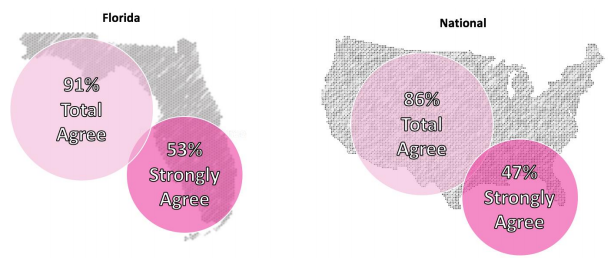
While government regulation of any kind is often viewed through a partisan lens, this doesn’t hold true regarding alcohol: 91% of Republicans, 90% of Democrats and 91% of Independents all agree that the alcohol industry should remain regulated.
Nearly 9 in 10 voters (88%) in Florida are also satisfied with the existing alcohol regulations in their state, and only 8% believe the regulations are too restrictive. The vast majority (68%) believe the regulations are “just about right” or “too lenient” (12%). This level of support and satisfaction top the national data.
“It’s clear that Floridians are among the strongest supporters of responsible alcohol regulation in the nation,” said Mike Lashbrook, Executive Director, Center for Alcohol Policy. “At a time when a few strident voices complain about restrictions on alcohol sales, it is important to note that huge majorities across all demographics support current regulations.”
Additional survey results show that Florida voters want alcohol regulations to prioritize safety. Americans say lawmakers should prioritize “protecting health and public safety” over “creating jobs and improving the economy” or “offering more choices and lower prices.” This support for protecting health and public safety also traverses the partisan spectrum.
Other important findings of the survey demonstrate that Floridians are satisfied with the availability and variety of alcohol products in their communities and express support for the three-tier system of alcohol distribution.
More details on the comprehensive survey may be found here.
###
The Center for Alcohol Policy is a 501c(3) organization whose mission is to educate policymakers, regulators and the public about alcohol, its uniqueness and regulation. By conducting sound and scientific-based research and implementing initiatives that will maintain the appropriate state-based regulation of alcohol, the Center promotes safe and responsible consumption, fights underage drinking and drunk driving and informs key entities about the effects of alcohol consumption. For more information, visit www.centerforalcoholpolicy.org or follow the Center on Twitter at www.twitter.com/AlcoholPolicy.






